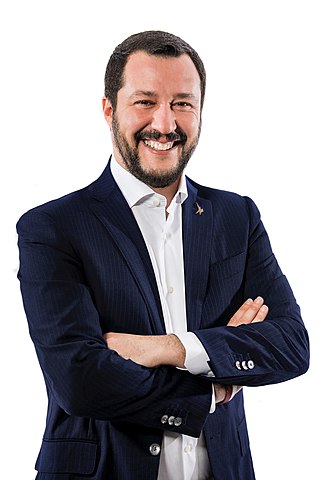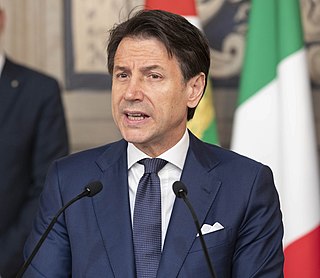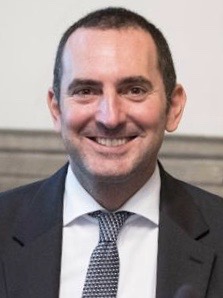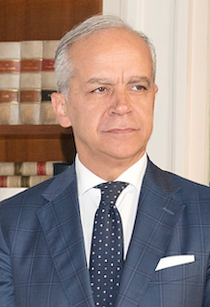
Matteo Salvini is an Italian politician who has been serving as Deputy Prime Minister of Italy and Minister of Infrastructure and Transport since 2022. He has been Federal Secretary of Italy's Lega party since December 2013 and an Italian senator since March 2018. Salvini represented Northwestern Italy in the European Parliament from 2004 to 2018.

Sergio Mattarella is an Italian politician and jurist who has been President of Italy since 2015. He is the longest-serving president in the history of the Italian Republic. Since Giorgio Napolitano's death in 2023, Mattarella has been the only living Italian president.

The Five Star Movement is a political party in Italy, led by Giuseppe Conte. The party was founded on 4 October 2009 by Beppe Grillo, a political activist and comedian, and Gianroberto Casaleggio, a web strategist. The party is primarily described as populist of the syncretic kind, due to its long-time insistence that it had no place in the left–right political spectrum. The party has been a proponent of green politics and direct democracy, and, more recently, progressivism, social democracy and left-wing populism. In 2024 the party officially described itself as "independent progressive".

The 2018 Italian general election was held on 4 March 2018 after the Italian Parliament was dissolved by President Sergio Mattarella on 28 December 2017. Voters were electing the 630 members of the Chamber of Deputies and the 315 elective members of the Senate of the Republic for the 18th legislature of the Italian Republic since 1948. The election took place concurrently with the Lombard and Lazio regional elections. No party or coalition gained an absolute majority in the parliament, even though the centre-right coalition won a plurality of seats as a coalition, and the Five Star Movement (M5S) won a plurality of seats as an individual party.

Luigi Di Maio is an Italian politician who has been serving as EU Special Representative for the Gulf region since 1 June 2023. Di Maio also served as Minister of Foreign Affairs from 2019 to 2022, as Deputy Prime Minister of Italy and Minister of Economic Development, Labour and Social Policies from 2018 to 2019, and as Vice President of the Chamber of Deputies in the 17th Italian legislature.

Lorenzo Guerini is an Italian politician and member of the Democratic Party (PD). Guerini has been serving as the Italian Minister of Defence in the cabinets of successive prime ministers Giuseppe Conte and Mario Draghi from 2019 to 2022. In March 2014, he was chosen by party leader Matteo Renzi to be deputy secretary of the PD along with Debora Serracchiani, a position that he held until May 2017. From 2005 to 2012, he served as mayor of Lodi, Lombardy, his hometown.
Events during the year 2018 in Italy.

Snap general elections were held in Italy on 25 September 2022. After the fall of the Draghi government, which led to a parliamentary impasse, President Sergio Mattarella dissolved Parliament on 21 July, and called for new elections. Regional elections in Sicily were held on the same day. The results of the general election showed the centre-right coalition led by Giorgia Meloni's Brothers of Italy, a right-wing political party with neo-fascist roots, winning an absolute majority of seats in the Italian Parliament. Meloni was appointed Prime Minister of Italy on 22 October, becoming the first woman to hold the office.

In the 2018 Italian general election, no political group or party won an outright majority, resulting in a hung parliament. On 4 March, the centre-right coalition, in which Matteo Salvini's League emerged as the main political force, won a plurality of seats in the Chamber of Deputies and in the Senate, while the anti-establishment Five Star Movement (M5S) led by Luigi Di Maio became the party with the largest number of votes. The centre-left coalition, led by Matteo Renzi and the then-governing Democratic Party (PD), came third. Protracted negotiations were required before a government formation could be ultimated.

Giuseppe Conte is an Italian jurist, academic, and politician who served as prime minister of Italy from June 2018 to February 2021. He has been the president of the Five Star Movement (M5S) since August 2021.

The first Conte government was the 65th government of the Italian Republic. It was led by Giuseppe Conte, an independent, and it was in office from 1 June 2018 to 5 September 2019.

The 2019 Italian government crisis was a political event in Italy that occurred between August and September 2019. It includes the events that follow the announcement of the Minister of the Interior and leader of the League, Matteo Salvini, that he would revoke League's support of the cabinet and ask the President of the Republic to call a snap election. This provoked the resignation of Prime Minister Giuseppe Conte, and resulted in the formation of a new cabinet led by Conte himself.

Vincenzo Spadafora is an Italian politician. A member of Together for the Future (IpF) and a former member of the Five Star Movement (M5S), he served as Minister for Youth Policies in the Conte government between 2019 and 2021.

The second Conte government was the 66th government of the Italian Republic and the second government led by Giuseppe Conte. The government was sworn in on 5 September 2019 to 13 February 2021.

Lega, whose official name is Lega per Salvini Premier, is a right-wing populist political party in Italy, led by Matteo Salvini. The LSP is the informal successor of Lega Nord.

The 2021 Italian government crisis was a political event in Italy that began in January 2021 and ended the following month. It includes the events that follow the announcement of Matteo Renzi, leader of Italia Viva (IV) and former Prime Minister, that he would revoke IV's support to the Government of Giuseppe Conte.

The Draghi government was the 67th government of the Italian Republic, led by former President of the European Central Bank, Mario Draghi. It was in office between 13 February 2021 and 22 October 2022.

The 2022 Italian presidential election was held in Rome between 24 and 29 January 2022. The president of Italy was elected by a joint assembly composed of the Italian Parliament and regional representatives. The election process extended over multiple days, culminating in incumbent president Sergio Mattarella being confirmed for a second term, with a total of 759 votes on the eighth ballot. This was the second most votes ever received by a presidential candidate. Mattarella became the second president to be re-elected, his predecessor Giorgio Napolitano being the first.

The 2022 Italian government crisis was a political event in Italy that began on 14 July. It includes the events that followed the announcement of Giuseppe Conte, leader of the Five Star Movement (M5S) and former Prime Minister of Italy, that the M5S would withdraw its support to the national unity government of Mario Draghi over a bill regarding an economic stimulus to combat the ongoing energy and economic crisis. The government fell a week later when the M5S, Lega, and Forza Italia deliberately refused to take part in a vote of confidence in the Government.

Matteo Piantedosi is an Italian prefect and civil servant serving as the Minister of the Interior in the Meloni Cabinet since 22 October 2022. An independent politician, he is close to Lega leader Matteo Salvini.





















